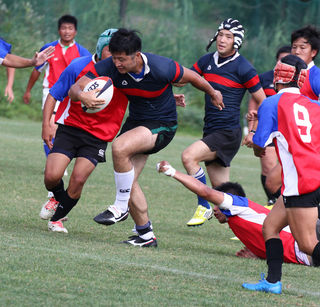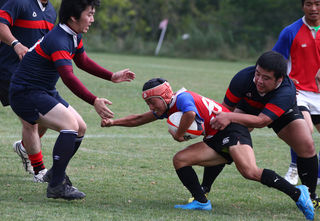Testosterone
Does Testosterone Really Just Make Men Aggressive?
New research turns conventional wisdom about male hormone on its head.
Posted July 13, 2017

The common assumption about testosterone is that it makes us more aggressive and competitive. But is this the entire story? Perhaps the effect of testosterone on behavior depends on our social rank.
To find out, my collaborators and I recruited male members of a Japanese university’s rugby team and had them play a game to test their cooperativeness. The results of our study were published today in the journal Scientific Reports.
An ultimatum
Before their regular practice we had the team members drool into a cup (nice!) so that we could test their saliva for testosterone. Then came the interesting part of the study. We had the men play a series of ultimatum games. The ultimatum game (or UG for short) is a commonly used task in economic research. It works like this. One player is the Proposer. He is given a pot of money and told to decide how much of that pot to offer to his opponent, the Responder. He can offer none, all, or any percentage in between. Next, the Responder decides to accept or reject the Proposer's offer. If he accepts, he receives the money offered by the Proposer, and the Proposer keeps the rest. But if the Responder rejects the offer, neither player gets any money.
As you can see, it's in the Proposer's best interest to not make too stingy an offer. If he does, he is very likely to be rejected and receive nothing! But he can probably get away with offering a little less than half, because the Responder may feel that 40 percent or even 30 percent of the pot is better than nothing.
The hierarchy

Normally, in a study like this, the opponents have no prior acquaintance. But in our study, all the players knew who was top of the pecking order. And in Japanese university sports teams, the hierarchy is rigidly enforced. According to my Japanese colleagues, players in their senior year wield almost absolute power over their subordinates, and freshmen have to follow every order of their superiors.
Now, we didn't tell the players who their opponents were: All the games were anonymous. But we did tell them the rank of their opponents. Everyone had the chance to play both as Proposer and Responder.
So how did the players' rank and their testosterone influence their performance in the UG?
Results
Some players offered very little of the pot to their opponent, but only accepted a proposal if it was large: We describe these dominant players as low in "willingness to acquiesce." Other players offered a big share of money, and were happy to accept a small offer in return: These men were high in "willingness to acquiesce."
We found that senior players with high levels of testosterone were less willing to acquiesce. This is what we would expect from folk theories about testosterone: high T equals more dominance.
However, among lower ranked players, higher testosterone levels were associated with greater willingness to acquiesce! What's going on?
Sensitivi-T
We think that testosterone primes men to attend to their position in the social hierarchy. Take a man who has high levels of testosterone: If he is atop the pecking order, his high levels of T encourage him to take advantage of his exalted position. He offers less and takes more.
However, if that same man recognizes that he is on the bottom rung of the ladder, his high T instead promotes strategic submission. He offers more and takes less, perhaps in the hope that this will appease his more powerful peers and aid his eventual rise to the top of the heap.
Men with low testosterone may not be so politically minded, and their social rank is not so relevant to their decisions to submit to or dominate their rivals.
If you liked this article, you might enjoy my podcast: The Psychology of Attractiveness Podcast.
References
Inoue, Y., Takahashi, T., Burriss, R. P., Arai, S., Hasegawa, T., Yamagishi, T., & Kiyonari, T. (2017). Testosterone promotes either dominance or submissiveness in the Ultimatum Game depending on players’ social rank. Scientific Reports, 7, 5335. Read the paper (open access)


